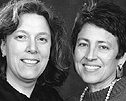Massachusetts became the first American state — and the sixth government in the world — to offer legal marriage to same-sex couples on May 17, 2004.
As a result of a suit, married, same-sex couples will finally be treated as next-of-kin within Massachusetts. The Massachusetts legal marriage status for same-sex couples is recognized by New York, and California, but not by the U.S. Government and many other states.
| The Suit |
On November 18, 2003, the Massachusetts Supreme Court ruled that same-sex couples are legally entitled to civil marriage under the Massachusetts Constitution. The 4-3 ruling did not order licenses to be issued to the couples who challenged the law. Instead, the court ordered the Legislature to change the civil marriage statutes within 180 days — on May 17, 2004.
| Massachusetts Court Finding Excerpt |
|
“The question before us is whether, consistent with the Massachusetts Constitution, the commonwealth may deny the protections, benefits and obligations conferred by civil marriage to two individuals of the same sex who wish to marry. We conclude that it may not. The Massachusetts Constitution affirms the dignity and equality of all individuals. It forbids the creation of second-class citizens. In reaching our conclusion we have given full deference to the arguments made by the commonwealth. But it has failed to identify any constitutionally adequate reason for denying civil marriage to same-sex couples.”
Click here for the entire Massachusetts ruling (61-page PDF file): Massachusetts Court Finding
|
The Legislature had no legal authority to legislate away the court’s ruling that it is a constitutional right to marry the person of one’s choice. It cannot attempt to rewrite discrimination into the marriage laws.
Efforts to deny equal rights have resulted in attempts to amend the Massachusetts state constitution. An amendment would need to be approved by the Constitutional Convention (the combined House and Senate) in two successive legislative sessions and then ratified by the public. The soonest an amendment could be brought to the public for a vote would be November 2006.
Further, polls conducted immediately following the ruling suggests that the public is not interested in undermining the Court’s ruling:
| Polls of Registered Voters — November 2003 |
|
Decision Research 59 percent support civil marriage 77 percent find the notion of civil marriage for gay people acceptable
The Boston Globe
The Boston Herald More polls on may be found in our article: Legal Marriage Surveys
|
| Events Following Winning the Suit |
- Massachusetts is the fourth U.S. state to have a high court rule in favor of legal marriage for same-sex couples. Following the court findings, Hawaii and Alaska altered their constitutions to prevent equal treatment of same-sex couples. And Vermont created a separate-but-not-equal domestic partner status called “Civil Unions.”
- In spite of the public sentiment in favor of legal marriage, the Massachusetts Senate gave its initial approval to a bill on December 11, 2003, that would allow same-sex couples to receive the same benefits and rights as married couples without labeling their unions as “marriages.”
Senators also adopted an order asking the Supreme Judicial Court if Civil Unions would satisfy its ruling that a ban on same-sex marriage is unconstitutional.
The House also prepared an anti-marriage bill, however, put it on hold until hearing from the Court. The House version goes further than the Senate’s in that it also contain a provision that explicitly defines marriage as the union of one man and one woman, basically, yet another anti-gay measure.
The Massachusetts high court ruled in their advisory opinion on February 4, 2004, that only full, equal marriage for same-sex couples — not Civil Unions — would meet the edict of its November decision. It should be clear to even the Massachusetts legislature that same-sex marriages will take place, as originally stated by the court, in May 2004.
“The history of our nation has demonstrated that separate is seldom, if ever, equal,” wrote the four justices who ruled in favor of marriage. Offering civil unions rather than full, legal marriage makes for an “unconstitutional, inferior, and discriminatory status for same-sex couples,” the court said.
- On February 9, 2004, AFL-CIO of Massachusetts president Robert J. Haynes sent a letter to the legislature urging lawmakers to defeat the proposed amendment banning gay marriage. The union has 400,000 members.
- The House and Senate met in a Constitutional Convention on February 11, 2004, to consider two proposed state constitutional amendments that would ban same-sex marriage. One of them contained a proposal for Civil Unions. While some lawmakers hoped to write marriage discrimination into the constitution, and overturn the court ruling, both amendments narrowly failed.
In arguing against the state constitutional marriage ban, Senator Dianne Wilkerson (D-Boston) related her experience as a black woman raised in Arkansas, where the hospital did not allow her mother to deliver her children. Sen. Wilkerson said:
“I know the pain of being less than equal and I cannot and will not impose that status on anyone else. I was but one generation removed from an existence in slavery. I could not in good conscience ever vote to send anyone to that place from which my family fled.”
On February 12, 2004, after two days of tense negotiations, three amendments met a slim defeat, and the Massachusetts Legislature suspended debate on the proposed ban.Meeting again to debate placing prejudice into the Massachusetts constitution, lawmakers met on March 11 and 12, 2004. This time, they voted three times to ban same-sex marriage and establish Civil Unions with “entirely the same benefits, protections, rights, and responsibilities” of marriage.
The House and Senate resumed their Constitutional Convention on March 29, 2004. The Legislature adopted a new version of a state constitutional amendment that would ban gay marriage and legalize civil unions, eliminating consideration of any other proposed changes. The revised version would ask voters to simultaneously ban same-sex marriage and legalize Civil Unions, rather than taking those steps separately. It clarifies that civil unions would not grant federal benefits to same-sex couples.
The Legislature must still take two more votes in the 2005-2006 legislative session for further consideration before going to the voters in the fall of 2006.
- Massachusetts Governor Mitt Romney told reporters he would ask the state’s highest court to block the pending same-sex marriages until the amendment process has run its lengthy course. However, Attorney General Tom Reilly, whose job it is to represent the state in court, said he would not seek the delay on Romney’s behalf.
Threatening marriage seekers from out-of-state, is a 1913 Massachusetts law, originally made to prevent interracial marriage. It renders “void” any marriage of a visiting couple that would be illegal in their home state.
In late April, three Democratic House members filed a bill to abolish this law, however, with the legislature worn out from all the recent marriage and anti-marriage bill discussions, it was unlikely to get anywhere.
On April 11, 2004, the town manager, Keith Bergman, said that town officials would not investigate to verify the home states, or backgrounds listed for gay couples on marriage license applications. Bergman said: “We’ve never been the marriage police with heterosexual couples, and we’re not about to start with same-sex couples.”
Laurence Pizer, the town clerk in Plymouth for the last 12 years, and a past president of the Massachusetts Town Clerks Association, said that he plans to accept the signed “Notice of Intent” from same-sex couples, just as he accepts the word of opposite-sex couples.
Worcester City Clerk David J. Rushford said his office would open at 8:30am, rather than 8:45am, on May 17 to accommodate the large number of couples he expects from outside Massachusetts. Rushford has pledged to defy Romney by issuing licenses to out-of-state couples.
One April 26, 2004 Governor Romney issued official state policy regarding the marriages which begin May 17. He told the 1,200 Justices of the Peace (JPs) that they will be obliged to ask for proof of residency. A Those clerks who ignore Romney’s policy could be in violation of the law.
Curiously, for 27 years, Department of Public Health documents have specifically instructed city and town clerks not to enforce eligibility requirements for marriage applicants, including a residency requirement.
The governor also said that the JPs would definitely be required to conduct marriages for same-sex couples who reside within the state.
As of May 15, 2004, according to head of the Massachusetts Justices of the Peace Association, Claire Mentus, only 11 of the state’s 1,200 justices resigned, most of them because of religious convictions. She said that the rest are ready to do their jobs.
By May 25, 2004, Provincetown, Somerville, Springfield, and Worcester, — towns that offered out-of-state marriage — announced that they were stopping the availability. On the governor’s orders, State Attorney General Reilly had sent warnings to those towns. However, he did not contact, two other communities still granting licenses to out-of-state couples.
In 2004, the clerk of Attleboro announced issuing licenses to same-sex couples from the 11 states that have not adopted so-called “Defense of Marriage Acts” that bar same-sex marriage. Fall River is likewise granting licenses to qualified applicants no matter what state they reside in.
- The top lawyer for the governor’s office, Dan Winslow, said that the oath of office will oblige JPs to perform same-sex weddings, regardless of their personal views, and that justices who cannot bring themselves to offer the services should resign.
- Provincetown’s Board of Selectmen voted in early April 2004 to permit marriages for out-of-state residents who complete a form stating that their marriage doesn’t break any laws.
- On April 27, 2004, state Representatives John Lepper (R-Attleboro), Betty Poirier (R-North
Attleboro), Philip Travis (D-Rehoboth), and 10 other legislators, as well as the right-wing group American Center for Law and Justice, joined in yet one more futile effort to block same-sex marriage from becoming legal. They asked the state’s highest court to reverse its November decision legalizing same-sex marriage, even though the same court reaffirmed its ruling last February.
The 13 lawmakers argue that the court lacked jurisdiction in the case under the state Constitution, rather it is the Legislature and governor who are entitled to determine marriage laws. The high court rejected such arguments as “erroneous” on May 5, when it dismissed the bid to overturn Goodridge.
Jurisdiction issues had been raised when the case was decided by a Superior Court judge in 2001, when the high court heard arguments in 2003, and when the same court reaffirmed its decision in February. Because this question has already been more than fully answered, their plea is totally baseless, and was dismissed on May 14, 2004.
- During April and May 2004, little or no headway was made on bills to recall the four justices who legalized same-sex marriage, or to allow the governor, a Republican, to appear before the high court to ask for a stay on same-sex marriage until a public vote can be held.
- On May 10, 2004, marriage opponents took the Massachusetts case to federal court in an attempt to stop the May 17 weddings from taking place. Right-wing groups — Liberty Counsel (Orlando, Fla.), Thomas More Law Center (Ann Arbor, Michigan), Citizens for the Preservation of Constitutional Rights (Boston), and the American Family Association Center for Law and Policy (Tupelo, Miss.) — brought the suit on behalf of Robert Largess of Boston, vice president of the Catholic Action League.
Their motion asked for an emergency stay, and argued that the state’s highest court had violated the U.S. Constitution by usurping the constitutional powers of the Legislature and the governor when it changed the state’s marriage laws. This stay was dismissed on May 13, 2004 by the 1st U.S. Circuit Court of Appeals, upholding the marriage ruling. However, the court said it would hear arguments on the request to bar same-sex unions in June, after several weeks of legal same-sex marriages.
- The Alliance Defense Fund (Scottsdale, Ariz.), and Salem, Massachusetts lawyer Philip Moran — on behalf of former Boston Mayor and Vatican ambassador Raymond L. Flynn, and businessman Thomas A. Shields — asked a Suffolk County Superior Court judge to throw out the Goodridge decision. The high court already rejected such arguments as “erroneous” on May 5, and did so again on May 11, 2004.
- On May 13, 2004, state Representative Philip Travis (D-Rehoboth) filed a bill seeking to remove Supreme Judicial Court Justice Margaret Marshall from the bench, blaming her for the decision that paved the way for same-sex marriage in Massachusetts. The bill is similar to another proposal that targeted all four justices who voted to legalize same-sex marriage.
- As of May 18, 2004, at least 900 couples applied for a marriage license in 29 of the state’s 351 cities and towns.
The Boston Globe surveyed 752 same-sex couples in 11 cities and towns. The survey, released on May 18, 2004, revealed that 60 percent of the couples who applied for the licenses were women, and 40 percent of the female couples had children in their households. Half of all the couples had been together for at least a decade.
Provincetown, Somerville, Springfield, and Worcester, as well as individual clerks in many other locations, defied the governor’s mean-spirited demands that clerks not process marriage applicants from out of state.
- By May 25, 2004, Provincetown, Somerville, Springfield, and Worcester, — towns that offered out-of-state marriage — announced that they were stopping the availability. On the governor’s orders, State Attorney General Reilly had sent warnings to those towns. However, he did not contact, two other communities still granting licenses to out-of-state couples.
The clerk of Attleboro is issuing licenses to same-sex couples from the 11 states that have not adopted so-called “Defense of Marriage Acts” that bar same-sex marriage. Fall River is likewise granting licenses to qualified applicants no matter what state they reside in.
- By June 17, 2004, there was a total of 2,468 marriage applications from same-sex couples, according to a Boston Globe survey of city and town clerks.
At least 164 out-of-state couples came to Massachusetts to get married, from 27 states and Washington, D.C. Nearly one-third were from New York, including 23 from New York City alone. Another third came from states surrounding Massachusetts. The rest came from Alabama, Tennessee, California, and Washington state.
Fifty-six couples wrote on their applications that they do not intend to move to Massachusetts, violating residency rules required by the governor. The Globe counted 23 cities and towns that accepted at least one application where both parties lived out of state. Four towns had openly defied the governor — Provincetown, Somerville, Springfield, and Worcester — Attleboro did so quietly. They all stopped after the attorney general’s order on May 21.
- On June 18, 2004, two suits were filed challenging the constitutionality and discriminatory enforcement by the governor’s activation of an heretofore unused 1913 law. The governor’s purpose was to prohibit clerks from issuing licenses to out-of-state same-sex couples.
Both suits seek declaratory and injunctive relief from the cease and desist order issued by the attorney general on May 21, and charge that the old law is unconstitutional as applied to same-sex couples — precisely because it is being used exclusively against same-sex couples.
One of the lawsuits, brought by the American Civil Liberties Union of Massachusetts, along with the law firm of Palmer and Dodge, represents the clerks from 13 cities and towns. It argues that state officials cannot be directed to apply a law in a discriminatory fashion. The selective enforcement of a law by state officials is as much an equal protection violation as is targeting black drivers for traffic tickets.
The second suit — Cote-Whitacre v. Department of Public Health — filed by Gay & Lesbian Advocates & Defenders (GLAD), represents eight out-of state couples, and states that the 1913 statute also tramples on the U.S. Constitution’s Privileges and Immunities Clause, which grants the citizens of all states the privileges and immunities of citizens in sister states.
It is interesting to note that on May 19, 2005, the Massachusetts legislature finally repealed a disused 330 year-old law that barred Native Americans from entering Boston.
- By May 11, 2005, 5,400 same-sex couples have been married in Massachusetts. Only three couples have filed divorce petitions.
- On May 27, 2005, the Massachusetts Supreme Judicial Court rejected a lawsuit brought by C. Joseph Doyle, executive director of the Catholic Action League, to halt same-sex marriages until voters decide on a constitutional amendment banning same-sex marriage.
- On September 14, 2005, a joint session of the Massachusetts House and Senate rejected 157-39 a proposed constitutional amendment that sought to ban same-sex marriage but legalize civil unions. It was the second time the legislature had confronted the measure, which was designed to be put before voters on a statewide ballot in 2006. Under state law, lawmakers were required to approve the measure in two consecutive sessions before it could move forward. It was rejected in less than two hours of debate.
- By September 2005, more than 6,100 same-sex couples have been married.
- By the end of January 2006, more than 7,300 same-sex couples married in Massachusetts, according to the Department of Public Health. Somewhere between 35 and 45 of those couples filed for divorce, according to an informal survey. The state probate courts do not officially track same-sex divorces.
- On March 30, 2006, the Massachusetts Supreme Court ruled on Cote-Whitacre v. Department of Public Health that Governor Mitt Romney and Attorney General Thomas F. Reilly had the authority to invoke the 1913 state law, which Massachusetts had created to block out-of-state interracial couples from marrying.
The Court upheld the 1913 law when it is used to block same-sex couples from Connecticut, Maine, New Hampshire, and Vermont, because same-sex marriage is prohibited in those states. The court, however, did not rule on the claims of the couples from New York and Rhode Island because state laws there are unclear regarding the prohibition of same-sex marriage. The court sent the case back to Superior Court Judge Carol Ball, who had upheld the 1913 law that was appealed, to determine on an “expedited basis” when same-sex marriage is legal in those two states.
Opening and closing statements from the dissenting opinion in Cote-Whitacre v. Department of Public Health by Associate Justice Roderick L. Ireland: “I write separately for five reasons. First, I believe that an appellate court must use a neutral, principled approach to decide every case before it. Second, the court articulated such a neutral, principled approach in Goodridge v. Department of Pub. Health, 440 Mass. 309 (2003) (Goodridge), holding that the liberty and equality provisions of the Constitution of Massachusetts prohibit the use of gender distinctions with respect to marriage. Third, Goodridge removed gender as an impediment to marriage (just as Loving v. Virginia, 388 U.S. 1 [1967], removed race as an impediment), and I believe that the rule of gender neutrality applies to the entire marriage statute. Fourth, principles of comity do not require rejection of the marriage license applications of nonresident same-sex couples. Finally, the Commonwealth’s resurrection and selective enforcement of a moribund statute, dormant for almost one hundred years, not only violates the ‘spirit’ of Goodridge, as stated by the judge below, but also offends notions of equal protection. It is, at its core, fundamentally unfair.”
“We are bound by our decision in Goodridge. Discrimination against same-sex couples, inasmuch as it occurs in the marriage statute, is, in my opinion, unconstitutional.
“Conclusion. In sum, Goodridge’s principle of gender neutrality in marriage licensing applies to the entire marriage statute, and principles of comity do not require rejection of nonresident same-sex marriage applications. The resurrection and selective enforcement of a moribund statute offend notions of equal protection and fundamental fairness.
“However, far from applying the principle of gender neutrality and providing a ‘blueprint’ to anyone regarding application of our marriage statutes, the concurring opinions ignore our redefined common law, and reconstruct the edifice of discrimination we dismantled in Goodridge. In doing so, the clock has been effectively turned back to the days when our common law defined marriage as one man and one woman. Therefore, I respectfully dissent.”
- On September 29, 2006, Massachusetts Superior Court Judge Thomas Connolly ruled that same-sex couples who reside in Rhode Island can marry in Massachusetts. The ruling only applies to Massachusetts allowing one other state’s citizens to apply for a marriage license. It does not require Rhode Island to honor that license.
- On November 9, 2006, Massachusetts legislators recess a constitutional convention until January 2, 2007, without voting on a citizen-proposed ballot measure to ban same-sex legal marriages. The move made it unlikely the measure would be acted on in time to get on the November 2008 ballot.
- On December 27, 2006, the state’s highest court declared lawmakers had a duty — one they could not legally enforce — to cast a vote on the constitutional amendment banning legal marriage for same-sex couples.
Outgoing Governor Mitt Romney had threatened to tie up the legislature’s pay raises if it failed to act. His threat is bizarre because, while the governor demands the legislature meet what he thinks is their constitutional responsibility, he threatens to not meet his.
Equally mean-spirited is that the Massachusetts Family Institute, part of the coalition behind the anti-gay amendment, said it would seek bar sanctions against attorneys at the legislature if the vote was not held.
On January 2, 2007, the Massachusetts Legislature voted and advanced the proposed constitutional amendment to ban same-sex marriage, pushing it over a critical hurdle to get onto the 2008 state ballot.
On June 14, legislators finally rejected the anti-gay, anti-marriage equality ballot question with a vote of 151-45. There will not be any ballot on banning same-sex marriage in Massachusetts.
- On July 31, 2008, Democratic Governor Deval Patrick signed a bill repealing the 70-year-old law which had been applied for proof of marriage eligibility. The House had voted, on July 29, 118-35 to repeal the law.
An analysis by the state Office of Housing and Economic Development found repealing the law would draw thousands of couples to Massachusetts, boosting the economy by $111 million, creating 330 jobs, and generating $5 million in taxes and fees over a three-year period.
Previous to July 31, 2008, the 70-year-old law had been applied for proof of marriage eligibility. Originally intended to stop interracial marriages, it required that a couple be legally able to marry in their home state. This law had been un-used for decades until the Republican Governor Mitt Rohmney re-instated the dormant law specifically for same-sex couples.
Because of the March 30, 2006 Massachusetts Supreme Court ruling, the 1913 state law can be used to block out-of-state same-sex couples from marrying if they are from Connecticut, Maine, New Hampshire, and Vermont, because same-sex marriage is prohibited in those states. Presumably it can be used to block marriages from all the other states that have anti-gay, anti-marriage laws and constitutional amendments. However, the ruling was still unclear for couples from New York and Rhode Island because those state laws are unclear regarding prohibition.
Clarification came on September 29, 2006, when Massachusetts Superior Court Judge Thomas Connolly ruled that same-sex couples from Rhode Island can marry in Massachusetts. While the earlier March ruling stated that the 1913 law can be used to stop same-sex couples from outside Massachusetts marrying, it could only be applied if a couple’s home state expressly forbids same-sex marriage. While most states do expressly forbid same-sex couples from marrying, Judge Connolly ruled that nothing in Rhode Island law “explicitly deems void or otherwise expressly forbids same-sex marriage.” With this ruling, Rhode Island couples can now marry in Massachusetts.
While the ruling only applied to Massachusetts allowing one other state’s citizens to apply for a marriage license. It did not, of course, require Rhode Island to honor that license.
| Suit Background |
In Goodridge v. Dept. of Public Health, seven Massachusetts couples, who have been in committed relationships between five and 30 years, sued for legal marriage on April 11, 2001. Four of the couples have young children; others have faced health crises. All are concerned about providing the security for each other and their families that automatically comes with a marriage license.
| The couples in Goodridge v. Dept. of Public Health | |

| • Julie and Hillary Goodridge, Boston. They are parents of a five-year-old daughter. |

| • Ed Balmelli and Michael Horgan, Boston. Both are from large families in central Massachusetts. |

| • Maureen Brodoff and Ellen Wade, Newton. They have a 12-year-old daughter. |

| • Gloria Bailey and Linda Davies, Orleans. This couple has been together for 30 years. |

| • Richard Linnell and Gary Chalmers, Northbridge. They are the parents of an eight-year-old daughter. |

| • Gina Smith and Heidi Norton, Northampton. They have four-year- and one-year-old sons. |

| • David Wilson and Robert Compton, Boston. Both are parents of grown children; David is the grandfather of four. |
|
All photos of the Massachusetts suit couples are by Mainframe Photographics, except for Heidi and Gina’s, which was taken by Gigi Kaeser. | |
The Massachusetts trial court had ruled against the seven same-sex couples on May 2002, concluding that having and raising children is central to the purpose of marriage, despite acknowledging that four of the seven couples in the case have children, and that Massachusetts law allows same-sex couples to jointly adopt.
Litigant Gina Smith:
“The decision is particularly troubling because Heidi and I, like many of our gay and lesbian neighbors, have children. We feel strongly that our sons deserve the same level of protection that other children in the state enjoy.”
| License Procedures |
| Massachusetts Marriage License Process |
* [Chapter 207: Section 2 Marriage of woman to certain relatives Links to Official State Instructions
|
| Recognition of Marriage License |
Federal Recognition
- None.
The Federal system will not recognize a same-sex marriage because of the DoMA law. You will not be able to file a joint tax return, sponsor a partner for immigration, receive social security widow benefits, etc.
[See our article: U.S. Federal Laws for the Legally Married.]
- In Massachusetts, yes.
If a company offers workplace benefits for opposite-sex couples who are married, they must offer those same benefits to same-sex couples. However, unlike opposite-sex couple, same-sex couples must pay federal taxes on those benefits. - Outside Massachusetts, depends, mostly none.
In states other than Massachusetts some businesses may recognize the license for benefits.
One state that will recognize a Massachusetts marriage license is New York.
[See the boxed information: States Recognizing a Marriage License below.]
However, many states have indicated — via law suits — that they would not recognize the license for benefits, custody, or divorce.
Even if a state does not recognize your legal marriage, and will not grant you a legal divorce, for instance, you may still be held responsible for the obligations of marriage, such as providing financial support, or being held responsible for your former partner’s debts.
- No. Yes. Maybe.
On December 18, 2004 the Boston Globe reported that some of the largest employers in Massachusetts have decided not to extend health benefits to legal same-sex spouses of employees, saying their federally regulated health plans are not bound by the Massachusetts court ruling permitting same-sex marriage. NStar Corp., General Dynamics Corp., FedEx Corp., the Adecco temporary employment agency, and Caritas Christi Health Care are among those that do not provide the same medical benefits that they provide to spouses of opposite-sex married couples.
These employers provide benefits through “self-insured” medical plans, in which the employer, not an insurer, collects the premiums and pays the medical and hospital bills of its workers. These employers said they are not required to cover same-sex spouses because self-insured plans are regulated by federal law, which defines marriage as a union only between a man and a woman. According to Mercer Human Resource Consulting, 66 percent of large U.S. employers with more than 500 workers are self-insured.
Some businesses have welcomed the legal marriage licenses as proof for workplace benefits. However, other businesses, such as the Boston Medical Center, have dropped their domestic partner plans, and now require that couples get legally married to receive benefits.
| Warnings: Marriage Law Pitfalls |
Married in Canada or Civil Unions in Vermont
- The legally status is not yet clear for same-sex partners to marry in Massachusetts if they already have a Vermont “Civil Union.”
- It is clear that same-sex partners may not marry in Massachusetts if they already have a Vermont “Civil Union” with different partners. Civil Unions are a marriage-like, legal status under Vermont state law.
- If you have a Civil Union and the relationship is over, you will need to have a dissolution procedure. Courts outside of Vermont have usually not been willing to dissolve a Union. The only clearly established way to dissolve a Union is by living in Vermont for one year and filing for dissolution. Failure to do so before marrying in Massachusetts could make you guilty of the crime of bigamy.
- If you were married in Canada, you are legally married no matter where you go. It may be possible to marry the same person again, although it is uncertain what the legal effect would be.
We cannot recommend that non-resident couples get married in Massachusetts, primarily because of the year residency that is required to divorce.
- Because many states refuse to recognize a same-sex marriage license, should a couple have a falling-out, divorce would likely be impossible unless one of the partners moved to Massachusetts.
- Besides the emotional reasons to dissolve a no-longer-functioning union, there are legal entanglements to consider. For instance, should one of the partners form a new relationship, they would not be able to sign up their new partner for workplace benefits. Most employers require an affidavit that stipulates that the partners are not married to anyone else or have another domestic partner.
- At least one partner must live in Massachusetts for one year before filing. If, however, the court believes that the party has moved there simply in order to get divorced, it may not grant the divorce.
- It takes at least six months for a divorce to become final, but generally takes longer. Trying to obtain a divorce in any other state may be impossible. If you live in a state that does not honor your marriage — which may not be determined until requesting something usually triggered by a marriage license — the state courts will also be unlikely to grant you a divorce.
Partners who are not Massachusetts citizens may be married in Massachusetts.
Previous to July 31, 2008, a 70-year-old law had been applied for proof of marriage eligibility. Originally intended to stop interracial marriages, it required that a couple be legally able to marry in their home state. This law had been un-used for decades until the Republican Governor Mitt Rohmney re-instated the dorment law specifically for same-sex couples.
Out-of-State Non-Recognition
Because many state laws forbid recognition of another state’s same-sex legal marriage license, a civil license would have little or no legal meaning.
It is possible that a Massachusetts couple would get married, then move elsewhere. While it is certain that the Federal system will refuse to recognize the license, it is now known that most states will likewise refuse to recognize it.
On December 7, 2007, the Rhode Island Supreme Court ruled that the State Family Court cannot recognize the couple’s legal marriage in Massachusetts, at least for purposes of divorce. Cassandra Ormiston and Margaret Chambers, a Rhode Island same-sex couple, married in Fall River, Massachusetts in 2004, and sought a divorce in Rhode Island Family Court in October 2006.
|
States Recognizing a Marriage License New York New York recognizes same-sex legal marriages, however, it has followed a tortured path in court. In 2004, then New York Attorney General Eliot Spitzer issued an opinion confirming that New York’s marriage recognition rule applies to marriages between same-sex spouses that are lawfully entered into in other jurisdictions. Between then and 2007, New York municipalities including New York City, Albany, Buffalo, Ithaca, Nyack, Rochester, and Brighton, as well as Westchester County, have similarly publicly confirmed that — consistent with the marriage recognition rule — these municipalities will respect marriages of same-sex couples validly performed outside the State. On June 6, 2006, Westchester County Executive Andrew Spano issued Executive Order No. 3, which provided that “every department, board, agency, and commission of the County of Westchester under my jurisdiction (shall) recognize same sex marriages lawfully entered into outside the State of New York in the same manner as they currently recognize opposite sex marriages” with regard to extending benefits and rights to those couples. On August 23, 2006, three Westchester County residents — represented by the anti-gay Alliance Defense Fund (ADF) — sued Spano, claiming that he did not have the right to issue the order. On November 30, 2006, Lambda Legal intervened in the case on behalf of Westchester County couple Michael Sabatino and Robert Voorheis, who married in Canada where same-sex couples may legally wed. March 12, 2007, the New York Supreme Court held that County Executive Spano adhered to New York law in respecting out-of-state marriages of same-sex couples living in Westchester County. In April 2007, the ADF appealed — again on behalf of three Westchester County taxpayers — to the New York Appellate Division, Second Department. On December 30, 2008, the New York Appellate Division affirmed dismissal of the case, confirming that Westchester County Executive Spano lawfully recognized out-of-state marriages of same-sex couples. In March 2009, New York’s highest court, the Court of Appeals, accepted the case for review following petition by the ADF. |
Note
Suing states for recognition is a highly expensive process, often taking years. Also, it should not be attempted without consulting national gay organizations with experience and knowledge of individual state law. The possibility of putting more “bad” law — that is, negative rulings — in place is extremely high, which could further entrench anti-marriage, anti-gay laws.
| Also see: |
| Governments that offer Full Legal Marriage | ||
|
Nations . Netherlands (2001) Belgium (2003) Canada (2005) Spain (2005) South Africa (2005) Norway (2009) Sweden (2009) Iceland (2010) Argentina (2010) Portugal (2010) Denmark (2012) France (2013) New Zealand (2013) Brazil (2013) Uruguay (2013) New Zealand (2013) United Kingdom (England, Wales) (2013) Luxembourg (2014) Finland (2014) Scotland (2014) Ireland (2015) Greenland (2015) United States (2015) Colombia (2016) Germany (2017) Malta (2017) Australia (2017) Austria (2019) Taiwan (2019) Ecuador (2019) Costa Rica (2020) Chile (2022) Estonia (2023) Nepal (2023) Greece (2024) |
US States . U.S. Supreme Court, June 26, 2015 Ruling: All States must allow legal, same-sex marriage. . These states had legal marriage before the ruling: . Massachusetts (2004) California (2008) Connecticut (2008) Iowa (2009) Vermont (2009) New Hampshire (2009) District of Columbia (2009) New York (2011) Maine (2012) Washington (2012) Maryland (2013) Rhode Island (2013) Delaware (2013) Minnesota (2013) Illinois (2013) Utah (2013) New Jersey (2013) Hawaii (2013) New Mexico (2013) Michigan (2014) - stayed pending legal challenge Oregon (2014) Wisconsin (2014) Arkansas (2014) - stayed pending legal challenge Pennsylvania (2014) Indiana (2014) Nevada (2014) Virginia (2014) Oklahoma (2014) Idaho (2014) West Virginia (2014) Alaska (2014) Arizona (2014) Wyoming (2014) Kansas (2014) - stayed pending legal challenge Florida (2014) Colorado (2014) North Carolina (2014) South Carolina (2014) Montana (2014) Alabama (2015) |
Native American Tribes . Coquille Tribe, Oregon (2009) Mashantucket Pequot Tribe, Connecticut (2010) Suquamish Tribe, Washington (2011) Port Gamble S’Klallam Tribe, Washington (2011) Little Traverse Bay Bands of Odawa Indians, Michigan (2013) Pokagon Band of Potawatomi Indians, Michigan (2013) Santa Ysabel Tribe, California (2013) Confederated Tribes of the Colville Reservation, WA (2013) Cheyenne & Arapaho Tribes, Oklahoma (2013) Leech Lake Band of Ojibwe, Minnesota (2013) Grand Portage Band of Chippewa, Minnesota (2013) Puyallup Tribe of Indians, Washington (2014) Salt River Pima-Maricopa Indian Community, Arizona (2014) Wind River Indian Reservation, Wyoming (2014) Blackfeet Indian Reservation, Montana (2014) San Carlos Apache Tribe, Arizona (2014) Fort McDermitt Paiute & Shoshone Tribes, OR & NV (2014) Fort McDowell Yavapai Community, Arizona (2014) Lac du Flambeau Band of Lake Superior Chippewa, WI (2014) Fond du Lac Band of Lake Superior Chippewa (2014) Keweenaw Bay Indian Community (2014) Pascua Yaqui Tribe (2014) Confederated Tribes of Coos, Lower Umpqua, & Siuslaw Indians (2014) Central Council of Tlingit & Haida Indian Tribes, Alaska (2015) Oneida Nation, Wisconsin (2015) Confederated Tribes of Siletz Indians (2015) Chemehuevi Indian Tribe (2015) Confederated Tribes of Grand Ronde (2015) Sault Ste. Marie Tribe of Chippewa Indians (2015) Stockbridge-Munsee Tribe (2016) Oglala Sioux Tribe (2016) Tulalip Tribe, Washington (2016) Menominee Nation (2016) Cherokee Nation (2016) |